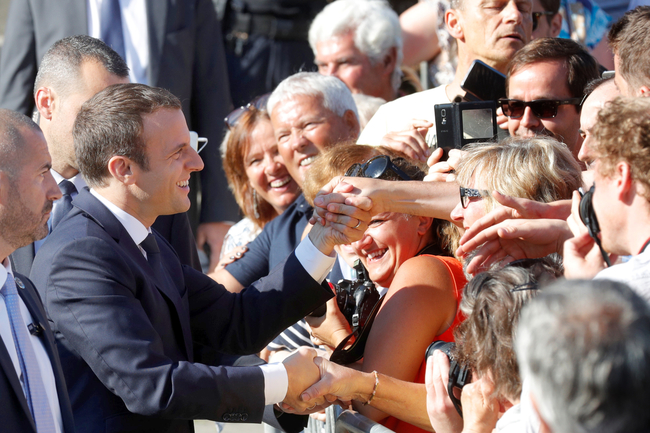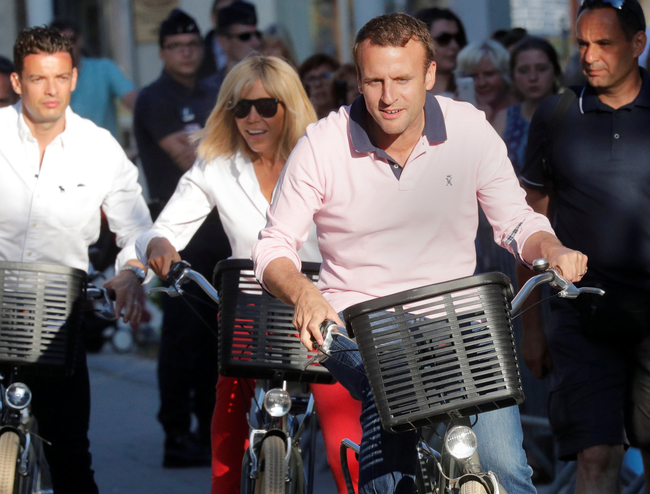“No one can really interfere with Emmanuel Macron’s plans”
The Day’s expert discusses surprises and protest voting in the second round of the French legislative election
The party of French President Emmanuel Macron La Republique En Marche! together with its allies won an absolute majority in the lower house of the country’s parliament. As reported on the website of the Ministry of the Interior of France, La Republique En Marche! will get 308 out of 577 seats in the nation’s new parliament, well above the 289-seat threshold is needed for an absolute majority. In addition, 42 seats will go to Macron’s allies, the centrist party Democratic Movement.
Observers point out that never since Charles de Gaulle’s victory in 1958 has a French president enjoyed such a powerful support in a parliament where the political careers of most MPs depend personally on him.
The main opposition force in the parliament will be the Republicans, who will be represented by 113 legislators. The Socialists have won 29 seats in the National Assembly. The Union of Democrats and Independents has received 18 seats. The independent political movement La France Insoumise, led by Jean-Luc Melenchon, has managed to send 17 representatives to the parliament. Leader of the National Front Marin Le Pen will enter the National Assembly for the first time. Her far-right party will receive 8 seats.
Another surprise is that the second round of the election witnessed a low voter turnout, which set a new antirecord dropping to a level of 42.6 percent.

REUTERS photo
European Commission President Jean-Claude Juncker congratulated French Prime Minister Edouard Philippe on the victory of the party En Marche! in the legislative election. “Congratulations @EPhilippePM. The renewed National Assembly embodies a resolutely modern France and is determined to be part of a strong future for the EU,” he tweeted.
German Chancellor Angela Merkel also congratulated French President Macron on his victory. “Congratulations, Emmanuel Macron, on the occasion of a clear parliamentary majority + further cooperation for Germany, France, and Europe,” German government spokesman Steffen Seibert quoted Merkel in his tweet.
The Day asked the head of the Russia department at the journal Politique Internationale Galia Ackerman to comment on the results of the French election and to tell us what first results should be expected from the Macron administration.
“THERE IS NO REASON TO SAY THAT WE HAVE ENTERED AN ERA OF MACRONISM WITHOUT RESISTANCE”
“The forecasts for the victory of the Macron movement along with its centrist allies were sky-high, putting their total at between 415 and 455 legislators. In reality, they won 350 seats and this is the largest majority for any party in the history of the Fifth Republic. By the way, all the ministers of the Macron cabinet have been reelected. This result is due to the fact that French elections are held in single-member constituencies. There are 577 of them and there may be several candidates in each of them. In particular, some of them saw more than 20 candidates participating in the first round. Two candidates who received the most votes progress to the second round. And in this case, the advantage in the first round does not guarantee ultimate victory, because it all depends on how people who voted for other candidates will vote. And so the results were quite unpredictable. Secondly, a rather fierce campaign was conducted. It seems to me that the French became afraid that the National Assembly would be completely under Macron’s thumb, that there would be no opposition, and since 455 legislators would mean not just an absolute majority, but hegemony, some voters chose another candidate.
“I do not rule out that the Macron supporters eased their efforts a little, because it seemed to them that the victory was there already. In the meantime, the right, who were expected to win 60 to 80 seats, won 137, that is, almost twice as many. They did a serious job to mobilize their voters in each constituency to vote for them.
“An unexpected result is Melenchon’s ultra-left party La France Insoumise winning 27 seats together with the Communist Party, enabling them to form a faction now. This requires a minimum of 15 legislators. Therefore, Macron and his allies will have a tough opposition.
“In another real surprise, eight candidates of the National Front will enter the National Assembly. Still, this is not enough to form a faction. At the same time, it should be noted that two scandal-hit members of the France-Russia parliamentary group, Thierry Mariani and Nicolas Dhuicq, who have assiduously supported Russia and visited Crimea, have failed to get into the parliament.
“All this shows that, despite the defeat of the two main political parties, the Republicans and the Socialists, these two political forces will still have 227 representatives who will be in opposition and so the parliamentary life will be quite stormy and the debates tough enough. That is, there is no reason to say that we have entered an era of Macronism without resistance. And the resistance will be quite tough. However, no one can really interfere with Macron’s plans now, except perhaps street protesters.
“He wants to make labor legislation more flexible and modern, fitting the current political situation. Of course, this will cause great resistance, which should be expected not so much from the parliament, but rather from the street, if protests will last for months and involve millions of people.
“Macron also wants to shorten the time for debates on new laws and specious amendments to them, the purpose of which is to block for months, if not years, the passage of legislative acts. And by the way, abovementioned Melenchon is an absolute champion in blocking laws. In short, we will see different rules of the game applying in the new parliament.”
What factors had decisive impact in the second round, determining who would be elected to the National Assembly, and what role did the external factor play in this?
“Because the election was held in single-member constituencies, it was difficult to influence their results. Of course, it is very hard to assess what was circulating on social networks at that time. On the one hand, legislators who worked well in the parliament and are known to their voters have been reelected. But in most cases, the composition of the National Assembly has radically changed. In most cases, people generally did not know who they were voting for and voted based just on the party label. For example, if a voter wanted Macron to carry out his reforms, they believed that he should have a majority in the National Assembly and voted for Macron’s candidate. Unlike the presidential election, it is very difficult to influence the voters’ decisions in this situation. What made a real impact was the big wave of discontent which appeared when according to the results of the first round Macron was supposed to get up to 450 seats in the National Assembly. Many did not like it. Therefore, there was protest voting on the ground in the second round. Voters voted not for Macron’s candidates, but for someone else. That played a role. I did not observe external interference, in particular on the part of Russia, in this election. To be more specific, it was very difficult to do.”
What conclusions do you think Ukraine should draw now that the election is over and the new composition of the National Assembly is known?
“In France, foreign policy is a prerogative of the president and, accordingly, the Ministry of Foreign Affairs. The parliament is engaged in legislative activities, not making foreign policy. I think that the Ukrainian side should try to activate the Ukrainian-French friendship group and closely follow the initiatives of the Russian-French friendship group. These groups are engaged in various parliamentary exchange initiatives, which have some importance. The real influence in this case lies with the Cabinet, the Ministry of Foreign Affairs, and the president, as well as experts who surround the president. After the recent talks between the resident of the Elysee Palace and the Russian president in Versailles, my feeling is that Macron, as a technocratic person, does not make decisions simply from some kind of insight, but engages in serious consideration of the issues in question with the experts first. As far as I have heard about his three experts, and this is not public information, they are, very importantly, really very good analysts and are not pro-Russian in the slightest.”
Newspaper output №:
№40, (2017)Section
Day After Day





